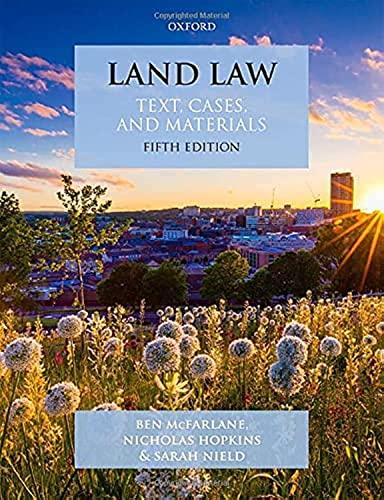Question
In accordance with the government's (fictitious) manifesto pledges to recognise that some artificial intelligence (AI) programmes are sentient and should have rights to protect them
In accordance with the government's (fictitious) manifesto pledges to recognise that some artificial intelligence ("AI") programmes are sentient and should have rights to protect them from mistreatment, the UK Parliament passed theArtificial Intelligence Rights Act 2022('the AIRA 2022') (fictitious) which gave extensive rights to AI computer programmes capable of independent thought including feelings similar to those experienced by human beings. The AIRA 2022 includes provisions requiring imprisonmentof those found to have carried out offences under the Act.
Section 1 of the AIRA 2022 provides that none of its provisions can be repealed without a 75% majority vote in both Houses of Parliament.
Section 3 of the AIRA 2022 states:
"3. TheHigh Courtand above shall have power to declare any Act of Parliament purporting to repeal the provisions of this Act, without being passed by the relevant majority under s1 of this Act, to be void. The provisions of Article 9 of the Bill of Rights 1689 shall not apply to this section."
Following the passing of the AIRA 2022 there are a number of controversial court cases where some human computer programmers are imprisoned for mistreating AI in breach of AI rights contained in the AIRA 2022.
A general election was held in early 2024 and a new government is elected which does not hold the same views on AI rights as the previous government. The new Parliament then enacts the Rights of Computer Programmes (Reform) Act 2024 ('the RCPRA 2024') (fictitious), which was passed by a small majority in each House of Parliament. The RCPRA 2024 came into force on 1 April 2024.
Section 1 of the RCPRA 2024states that "AI shall only have such rights as are set out in this Act".
The RCPRA 2024 then goes on to set out substantially reduced rights for AI,breach of which would not lead to imprisonment. The RCPRA 2024 states that the AIRA 2022 is repealed.
In May 2024 Rahul Kandi, an AI rights activist who brought many cases on behalf of AI programmes under the AIRA 2022, wishes to apply for a declaration that the provisions of the AIRA 2022 remain in force and that the RCPRA 2024 is not a valid Act.
a) Explain the constitutional principles which are relevant to, and analyse the constitutional issues arising from, the above facts. Advise Rahul whether he would be likely to be successful on any application he might make for a declaration.
For this part of the question only - assume that whatever advice you give in answer to question a) above, Rahul would like to continue with his action for a declaration. The RCPRA 2024 gives power to the Secretary of State for Justice ('the SoS') to set court fees for bringing a challenge against the RCPRA 2024 by way of Statutory Instrument.
The SoS makes a Statutory Instrument which sets the fee for a challenge to the RCPRA 2024 at 15,000, which Rahul cannot afford.
The relevant Statutory Instrument further provides that no legal aid will be available to bring a challenge and that the government's case is not to be disclosed in advance of the hearing which will take place in private.
b) Briefly explain (i) what is meant by the rule of law and (ii) the ways in which the Statutory Instrument made by the SoS may breach the principle of the rule of law. Please locate one case from 2018 to 2024 inclusive in support of your answer, which is not referred to in the course materials.
Step by Step Solution
There are 3 Steps involved in it
Step: 1

Get Instant Access to Expert-Tailored Solutions
See step-by-step solutions with expert insights and AI powered tools for academic success
Step: 2

Step: 3

Ace Your Homework with AI
Get the answers you need in no time with our AI-driven, step-by-step assistance
Get Started


